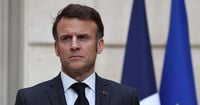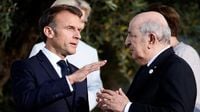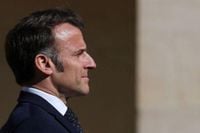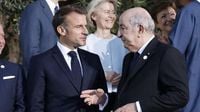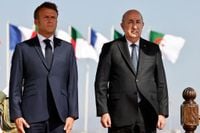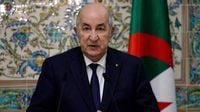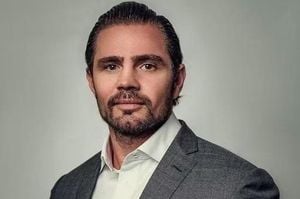On March 31, 2025, French President Emmanuel Macron and Algerian President Abdelmadjid Tebboune agreed to revive the bilateral relationship between France and Algeria after months of crisis. This agreement comes in the wake of escalating tensions that have plagued the two countries, primarily revolving around the controversial imprisonment of Franco-Algerian writer Boualem Sansal and other political disputes.
The two leaders engaged in a telephone conversation on the day of Aïd el-Fitr, marking the end of Ramadan, during which they expressed a mutual desire to renew the fruitful dialogue established during Macron's visit to Algiers in August 2022. According to a joint statement, they acknowledged that the strength of the ties—especially the human connections—between France and Algeria, along with their respective strategic and security interests, necessitated a return to equal dialogue.
One of the critical points discussed was the immediate resumption of security cooperation, which is deemed essential for combating terrorism, particularly in the Sahel region, and addressing human trafficking. The leaders also emphasized the need to reinitiate migration cooperation, which has been a focal point of recent crises, stating that this should be done in a manner that responds to the concerns of both nations.
The bilateral relationship has faced significant strain due to various factors, including Macron's recognition of Moroccan sovereignty over Western Sahara in July 2024, which angered Algeria. The situation worsened further when Boualem Sansal was arrested in November 2024 for comments made on a far-right French media outlet, which were perceived as undermining Algeria's territorial integrity. His recent sentencing to five years in prison has drawn international condemnation and calls for clemency from Macron.
During the recent conversation, Macron reiterated his confidence in Tebboune's leadership and called for a "gesture of clemency and humanity" towards Sansal, given the writer's age and health condition. The French president had previously voiced his support for Sansal and his family, urging the highest Algerian authorities to make humane decisions regarding the writer's fate.
In addition to addressing the issue of Sansal, Macron and Tebboune agreed to continue and finalize the historical memory work related to the colonization of Algeria by France from 1830 to 1962, as well as the subsequent war of independence from 1954 to 1962. A joint commission of historians, which had been inactive for several months, will resume its work to submit concrete proposals to the two heads of state before the summer of 2025.
To further solidify this renewed cooperation, French Foreign Minister Jean-Noël Barrot is scheduled to visit Algiers on April 6, 2025, to enhance the bilateral relationship. Additionally, Justice Minister Gérald Darmanin will also be making a visit soon to revive judicial cooperation between the two countries.
The recent crisis in Franco-Algerian relations peaked following the Mulhouse attack on February 22, 2025, where one person was killed by an Algerian individual who had previously been the subject of multiple readmission requests refused by Algeria. This incident added fuel to the ongoing diplomatic tensions, particularly regarding the readmission of Algerians subject to expulsion from France.
Despite the progress made during the recent discussions, experts caution that the relationship remains fragile. Hasni Abidi, director of the Center for Studies and Research on the Arab and Mediterranean World in Geneva, noted that while this marks the end of a crisis, it does not signify a full normalization of relations, which is still contingent on the release of Boualem Sansal. He predicts that issues related to Algeria, including memorial questions, security concerns, and economic relations, will remain central topics of discussion until at least 2027.
The renewed dialogue between Macron and Tebboune reflects a mutual recognition of the importance of cooperation in addressing shared challenges. However, both leaders will need to navigate the complex landscape of domestic politics and historical grievances to ensure a stable and productive partnership moving forward.
